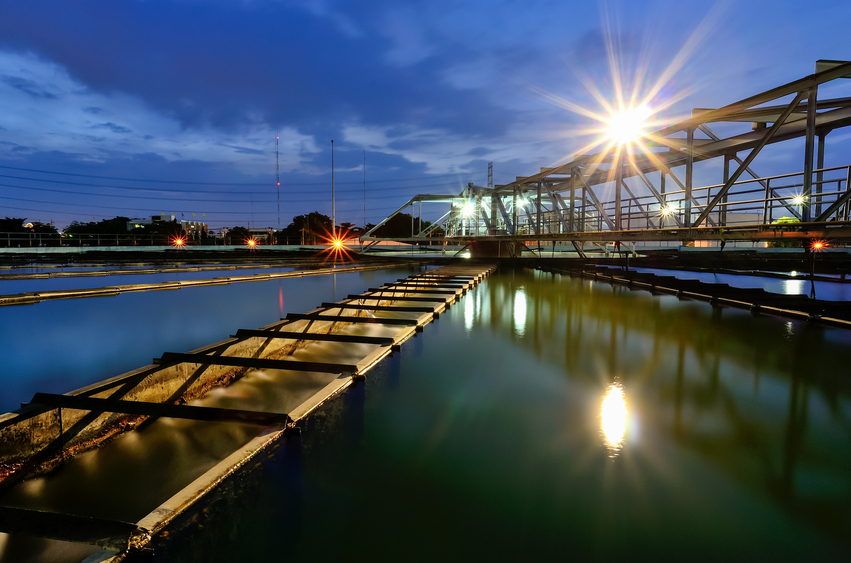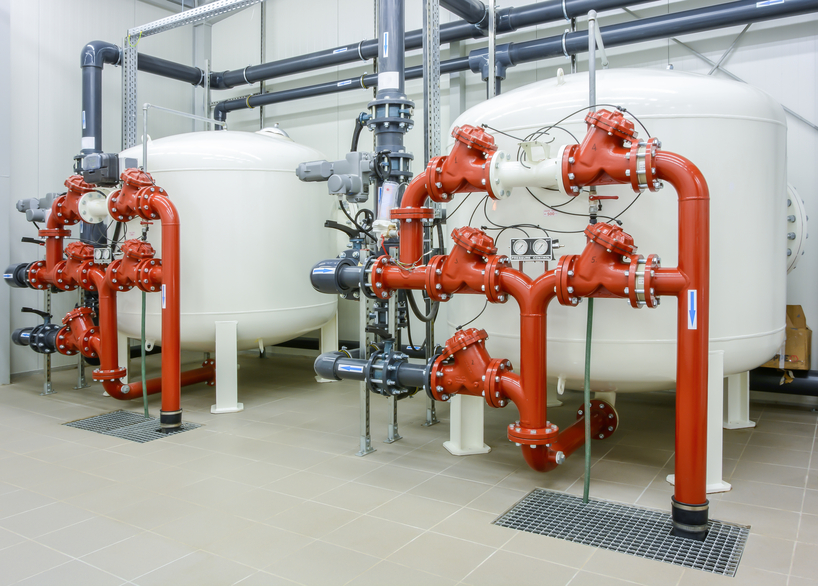Wastewater and Florida Laws, Rules & Ethics 18 PDH Discount Package 3
Courses in this Package
Primer for Municipal Wastewater Treatment Systems (C03-033)
Background Use of Onsite Wastewater Treatment Systems (C02-008)
Biological Wastewater Treatment II - MBBR Processes (C04-045)
Water Treatment and Purification (H05-004)
Energy Audits for Water and Wastewater Treatment Plants and Pump Stations (M02-041)
Engineering Laws, Rules and Ethics for Florida Professional Engineers (FL2-006)

This online engineering PDH course provides an overview of the need for and characteristics of municipal wastewater treatment systems. Various types of pollutants are described. Primary, secondary, and advanced treatment processes are discussed. Issues of disposal of wastewater residuals and biosolids are presented. The discussion is extended to decentralized systems as well. Technical terms are clearly defined and explained.
This 3 PDH online course is intended for civil, mechanical, and construction engineers who need a basic overview of municipal wastewater treatment systems.
This PE continuing education course is intended to provide you with the following specific knowledge and skills:
- Understanding the Clean Water Act requirements for wastewater treatment
- Understanding the need for wastewater treatment
- Learning about centralized collection
- Familiarizing with the types of pollutants
- Learning about the advanced methods of primary and secondary treatment
- Learning about disinfection through the use of chlorine, ozone and ultraviolet radiation
- Learning about the use or disposal of wastewater residuals and biosolids
- Understanding the management of onsite/decentralized wastewater systems
In this professional engineering CEU course, you need to review the U.S. Environmental Protection Agency publication titled, "Primer for Municipal Wastewater Treatment System", EPA 832-R-04-001, dated September 2004.
Upon successful completion of the quiz, print your Certificate of Completion instantly. (Note: if you are paying by check or money order, you will be able to print it after we receive your payment.) For your convenience, we will also email it to you. Please note that you can log in to your account at any time to access and print your Certificate of Completion.

This online engineering PDH course describes how onsite wastewater treatment systems (OWTS) have evolved throughout the years along with changing regulations. It also discusses current uses and types (performance-based vs. prescriptive requirements) of OWTS as well as the management program problems associated with such systems. Finally, this course presents initiatives taken to improve onsite system treatment and management.
Onsite wastewater treatment systems have evolved from the pit privies used widely throughout history to installations capable of producing a disinfected effluent that is fit for human consumption. Although achieving such a level of effluent quality is seldom necessary, the ability of onsite systems to remove settleable solids, floatable grease and scum, nutrients, and pathogens from wastewater discharges defines their importance in protecting human health and environmental resources. In the modern era, the typical onsite system has consisted primarily of a septic tank and a soil absorption field, also known as a subsurface wastewater infiltration system, or SWIS.
This 2 PDH online course is applicable to civil and environmental engineers, as well as design and construction personnel involved with the design and installation of onsite wastewater treatment systems.
This PE continuing education course is intended to provide you with the following specific knowledge and skills:
- Regulation of onsite wastewater treatment systems
- Onsite wastewater treatment system use, distribution, and failure rate
- Problems with existing onsite wastewater management programs
- Performance-based management of onsite wastewater treatment systems
- Coordinating onsite system management with watershed protection efforts
- USEPA initiatives to improve onsite system treatment and management
In this professional engineering CEU course, you need to review Chapter 1 of the EPA Onsite Wastewater Treatment Systems Manual, EPA/625/R-00/008, "Background Use of Onsite Wastewater Treatment Systems".
Upon successful completion of the quiz, print your Certificate of Completion instantly. (Note: if you are paying by check or money order, you will be able to print it after we receive your payment.) For your convenience, we will also email it to you. Please note that you can log in to your account at any time to access and print your Certificate of Completion.

This online engineering PDH course provides a discussion and detailed examples of process design calculations for a single stage BOD removal MBBR (moving bed biofilm reactor) system, a two-stage BOD removal MBBR system, a single stage tertiary nitrification MBBR system, a two-stage BOD removal/Nitrification MBBR system a post-anoxic denitrification MBBR system and a pre-anoxic denitrification MBBR system.
This course is Part II of a three-part series. The other two courses in this Biological Wastewater Treatment series are about activated sludge processes (Part I) and Membrane Biofilm Reactor (MBR) processes (Part III).
The MBBR process is an attached growth process that uses plastic carriers to provide a surface on which biofilm grows. The MBBR process doesn’t require sludge recycle, because the biomass remains in the system attached to the plastic carriers. The required reactor size for an MBBR process is typically significantly smaller than that for an activated sludge process treating the same wastewater flow, or for other common attached growth processes like the RBC or trickling filter. It can be used for BOD removal, biological nitrification, biological denitrification, and biological phosphorus removal.
This 4 PDH online course is intended primarily for civil engineers, environmental engineers, and chemical engineers. After completing this course you will be familiar with the general components and configuration of an MBBR wastewater treatment process and be able to make typical process design calculations for an MBBR process.
This PE continuing education course is intended to provide you with the following specific knowledge and skills:
- Understanding the differences between attached growth and suspended growth biological wastewater treatment processes
- Familiarizing with the components of and the general configuration of an MBBR wastewater treatment process
- Calculating the loading rate of a wastewater constituent to an MBBR process (in lb/day and g/day) for a specified wastewater flow rate and constituent concentration
- Calculating the required carrier surface area for an MBBR wastewater treatment process for a specified SALR and loading rate.
- Calculating the required MBBR tank volume for specified carrier surface area, carrier specific surface area and carrier fill %
- Calculating the liquid volume in an MBBR tank for known tank volume, carrier volume and carrier % void space
- Calculating the BOD, NH3-N, or NO3-N removal rate for known values of the surface area removal rate (SARR) and design carrier surface area
- Calculating an estimated effluent BOD, NH3-N or NO3-N concentration based on known values of the appropriate loading rate, estimated removal rate, and design wastewater flow rate
- Learning how to make process design calculations for a post-Anoxic denitrification MBBR process, including required tank sizes, estimated effluent concentrations, alkalinity requirement and carbon source requirement
- Learning how to make process design calculations for a pre-Anoxic denitrification MBBR process, including required tank sizes, estimated effluent concentrations, alkalinity requirements
MBBR BOD Removal Nitrification_US units (395 KB)
MBBR Nitrification-Denitrification-U.S (213 KB)
Upon successful completion of the quiz, print your Certificate of Completion instantly. (Note: if you are paying by check or money order, you will be able to print it after we receive your payment.) For your convenience, we will also email it to you. Please note that you can log in to your account at any time to access and print your Certificate of Completion.

This online engineering PDH course provides an overview of water treatment and purification.
Water is the most important substance on earth. As an engineer, you might be responsible for ensuring that an adequate supply of safe water is available for domestic, fire protection, and other uses. In meeting this responsibility, you must consider several factors, such as water source selection, ways to develop the water source, contaminants you may encounter, and methods you can use to remove them.
In this course, we will discuss the selection of a good water source, how to test it, and how to treat it so that it is safe for consumption. We will also explore ways to detect and treat water that has been contaminated with chemical, biological, or radiological agents. Lastly, we will talk about the different types of water treatment equipment and their processes.
This 5 PDH online course is applicable to chemical, civil, mechanical and environmental engineers and other professionals who are interested in gaining a better understanding of water treatment and purification processes.
This PE continuing education course is intended to provide you with the following specific knowledge and skills:
- Familiarizing with the requirements for water source selection
- Learning about the development criteria for water sources
- Understanding the results and testing procedures for water contamination
- Gaining an overview of the different types of water treatment equipment
Upon successful completion of the quiz, print your Certificate of Completion instantly. (Note: if you are paying by check or money order, you will be able to print it after we receive your payment.) For your convenience, we will also email it to you. Please note that you can log in to your account at any time to access and print your Certificate of Completion.

This online engineering PDH course will cover how to plan, prepare and execute a process energy audit for a water or wastewater treatment plant or pump station as well as analyze the results and discuss energy saving strategies and energy conservation measures.
Water and wastewater utilities consume approximately 4% of the power in the United States. For water utilities the largest energy consuming operation is pumping, while for wastewater utilities secondary and tertiary treatment are the processes consuming the largest quantities of power. Reducing process energy consumption in a water or wastewater treatment plant starts with a process energy audit specific to this type of facility.
This 2 PDH online course is applicable to engineers, designers, contractors, facility managers and plant operators who are interested in learning about energy audits for water and wastewater treatment plants and pump stations.
This PE continuing education course is intended to provide you with the following specific knowledge and skills:
- Understanding how energy is used in a water and wastewater treatment plant
- Understanding electric utility billing rates
- Learning how to benchmark a water or wastewater treatment plant
- Learning how to plan and execute an investment grade energy audit
- Learning how to analyze energy audits and identify possible energy optimization tactics
In this professional engineering CEU course, you need to review the course document titled, "Energy Audits for Water and Wastewater Treatment Plants and Pump Stations".
Upon successful completion of the quiz, print your Certificate of Completion instantly. (Note: if you are paying by check or money order, you will be able to print it after we receive your payment.) For your convenience, we will also email it to you. Please note that you can log in to your account at any time to access and print your Certificate of Completion.

Upon successful completion of the “Engineering Laws, Rules and Ethics for Florida Professional Engineers” course, we will report your PDH credits for this course to the FBPE within 2 business days. Therefore, it is imperative that you indicate your Florida PE license number in your CED account so that we can successfully do so. Once reported, please allow up to 48 hours for the FBPE to update their database.
This online PDH course is a FL approved Engineering Laws, Rules and Ethics course and is being offered by Continuing Education and Development, Inc, a FL approved Continuing Education Provider (CEP No. 0004183).
The first part of this course begins with an overview of the Laws and Rules governing the practice of engineering in the State of Florida (Chapter 1) including:
- Florida Statutes, Chapter 455, “Department of Business and Professional Regulation”
- Florida Statutes, Chapter 471, “Engineering”
- Florida Administrative Code, 61G15, F.A.C., “Florida Board of Professional Engineers”
Then it continues to address the rules amended, adopted or otherwise repealed from 61G15, F.A.C. (Chapter 2) as well as the changes to Chapters 455, F.S. and 471, F.S. (Chapter 3), within the preceding biennium, as applicable.
The second part of this course presents engineering ethics and the principles of professional responsibility (Chapter 4). It further illustrates the application of Chapters 455 and 471, F.S. to a randomly selected set of ethical and disciplinary cases (Chapter 5).
This 2 PDH online engineering course is applicable to Professional Engineers licensed in the State of Florida and who are required to demonstrate continuing professional competency in the Florida Laws, Rules and Ethics as a condition of license renewal. For each renewal period, every licensee must complete eighteen (18) professional development hours as follows:
- One hour must relate to this chapter and the rules adopted under this chapter;
- One hour must relate to professional ethics;
- Four hours must relate to the licensee’s area of practice; and
- The remaining hours may relate to any topic pertinent to the practice of engineering.
This PE continuing education engineering course is intended to provide you with the following specific knowledge and skills:
- Understanding the different Florida laws and rules regulating the practice of engineering in the State of Florida and their application to Professional Engineers
- Learning the rules adopted, amended or repealed from 61G15 within the preceding biennium
- Learning the changes made to Chapters 455, F.S. and 471, F.S. within the preceding biennium
- Understanding ethical behavior and the principles of professional responsibility in the field of engineering
- Understanding the general application of Chapters 455 and 471, F.S. to various ethical and disciplinary cases of Professional Engineers
Upon successful completion of the quiz, print your Certificate of Completion instantly. (Note: if you are paying by check or money order, you will be able to print it after we receive your payment.) For your convenience, we will also email it to you. Please note that you can log in to your account at any time to access and print your Certificate of Completion.